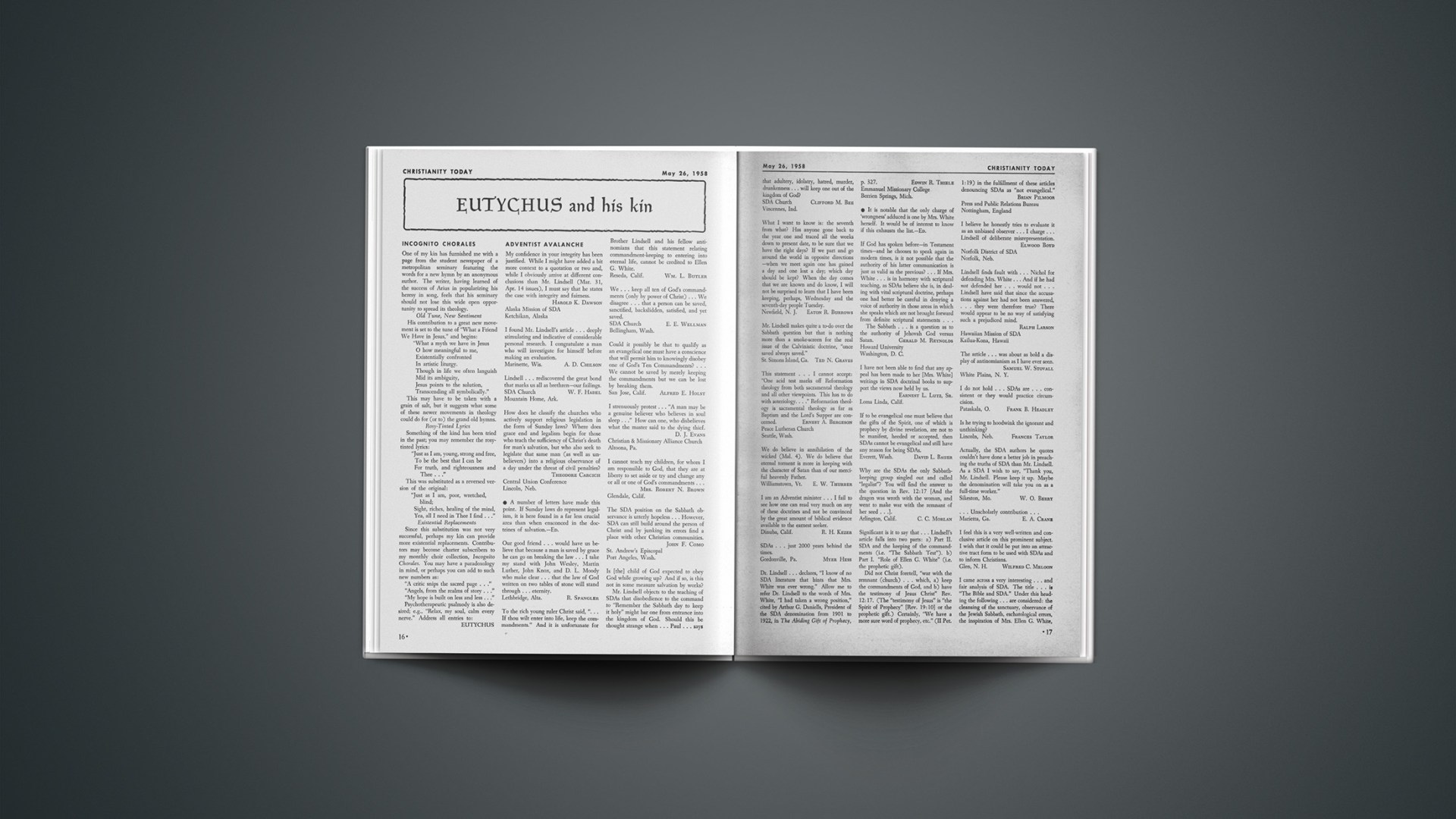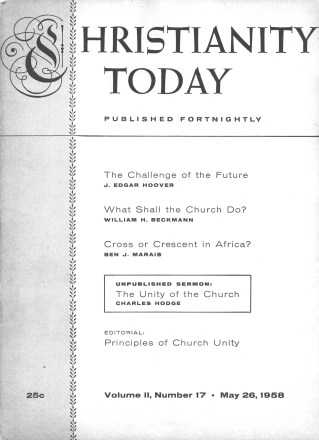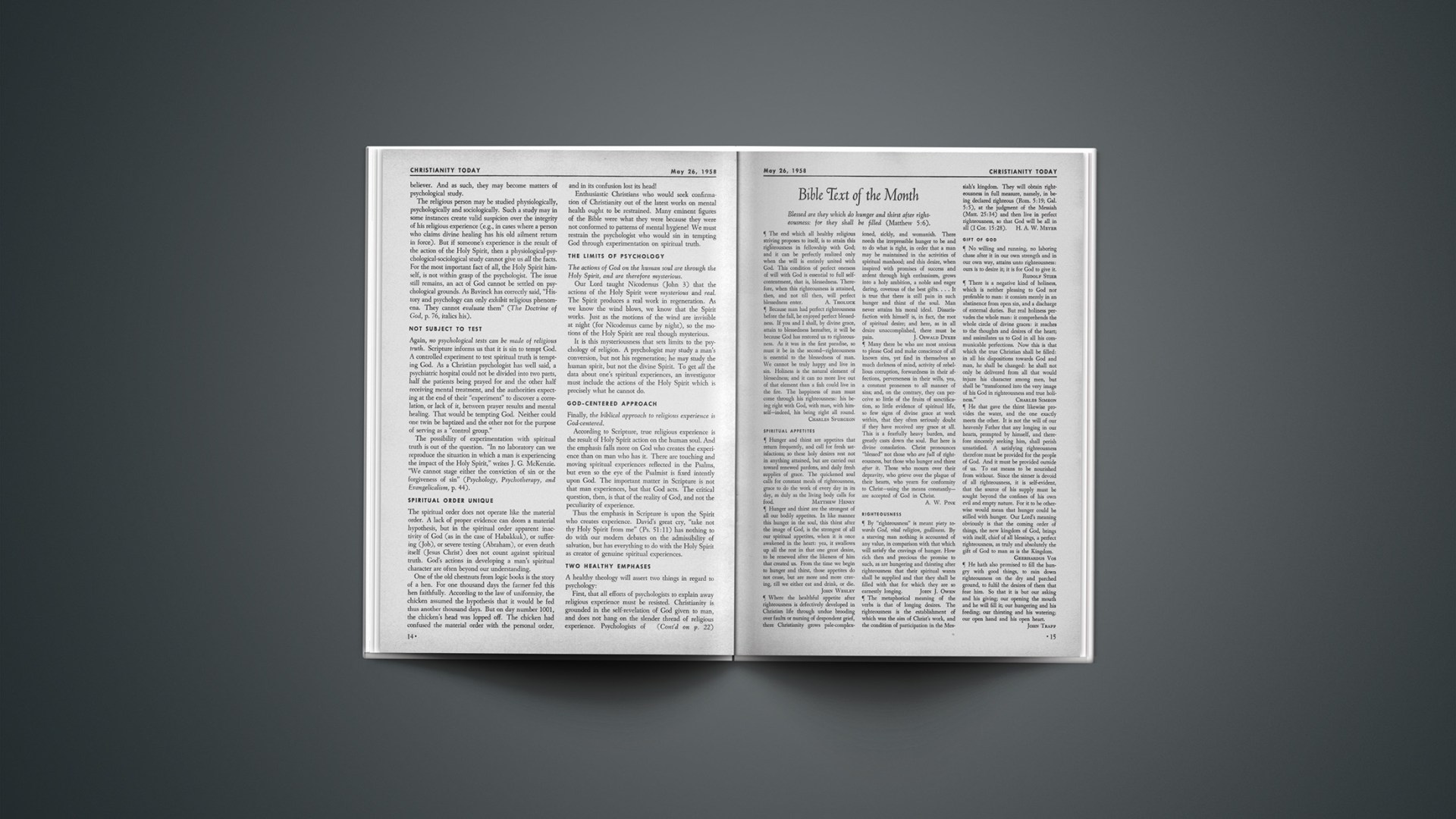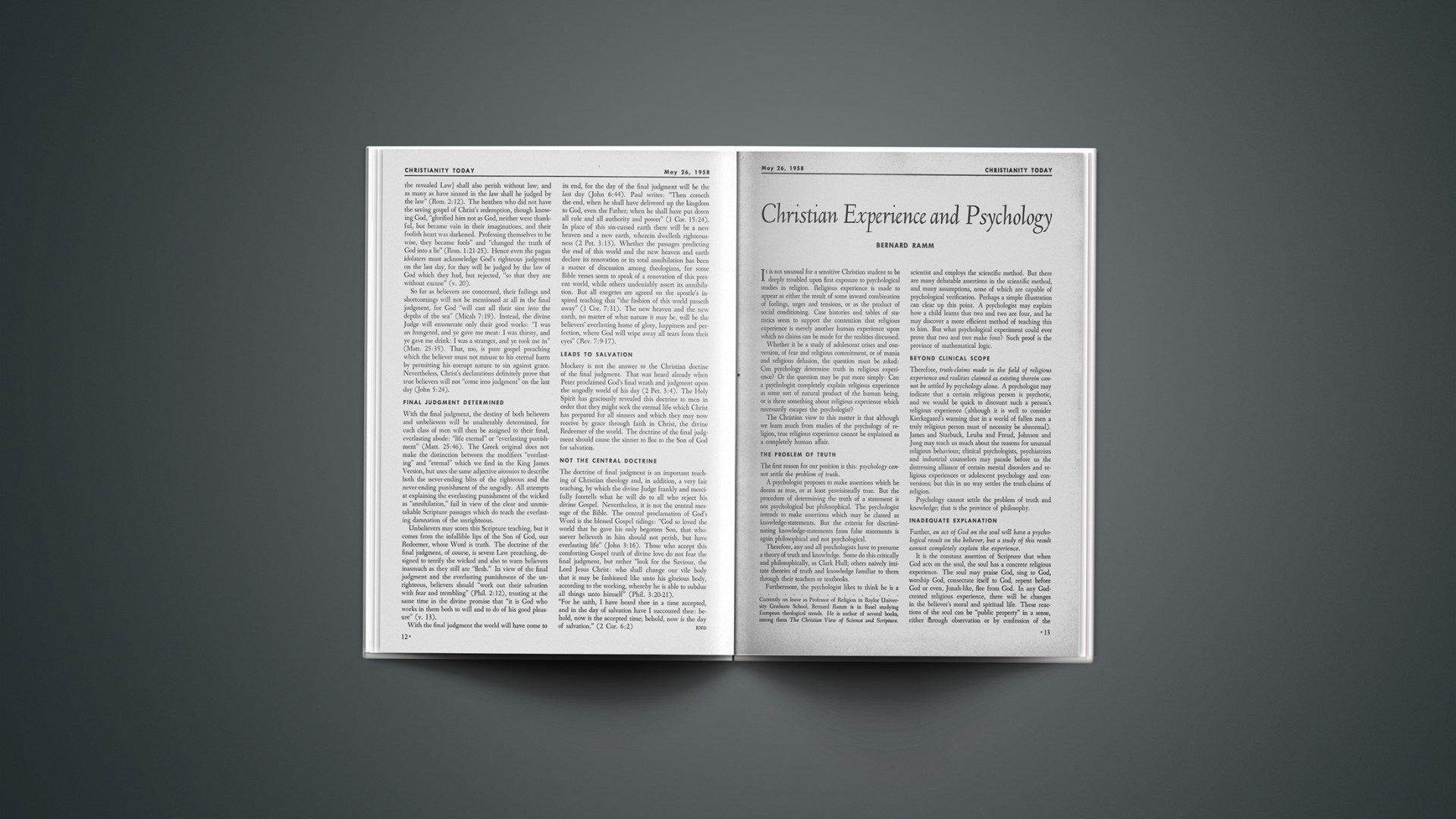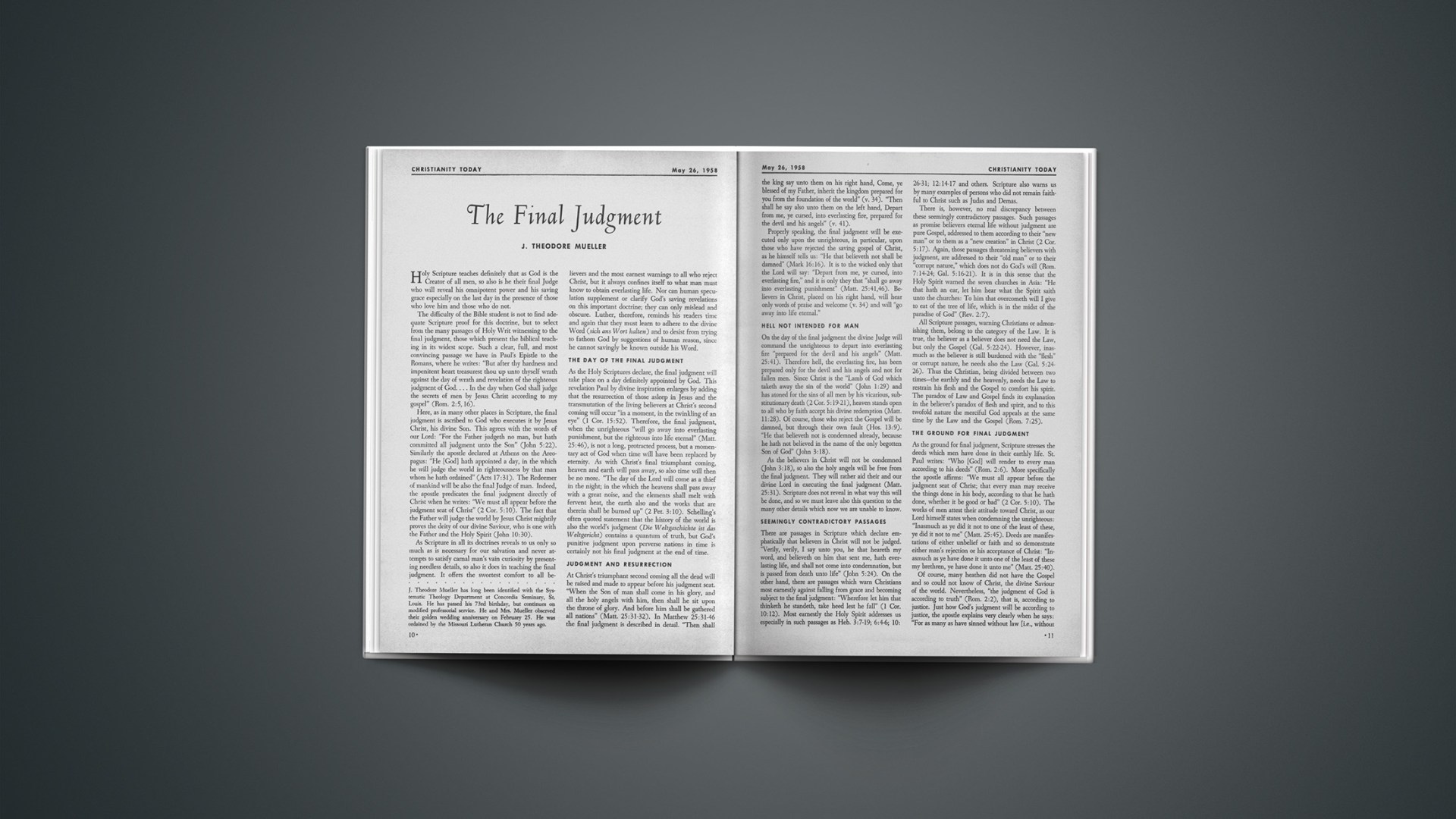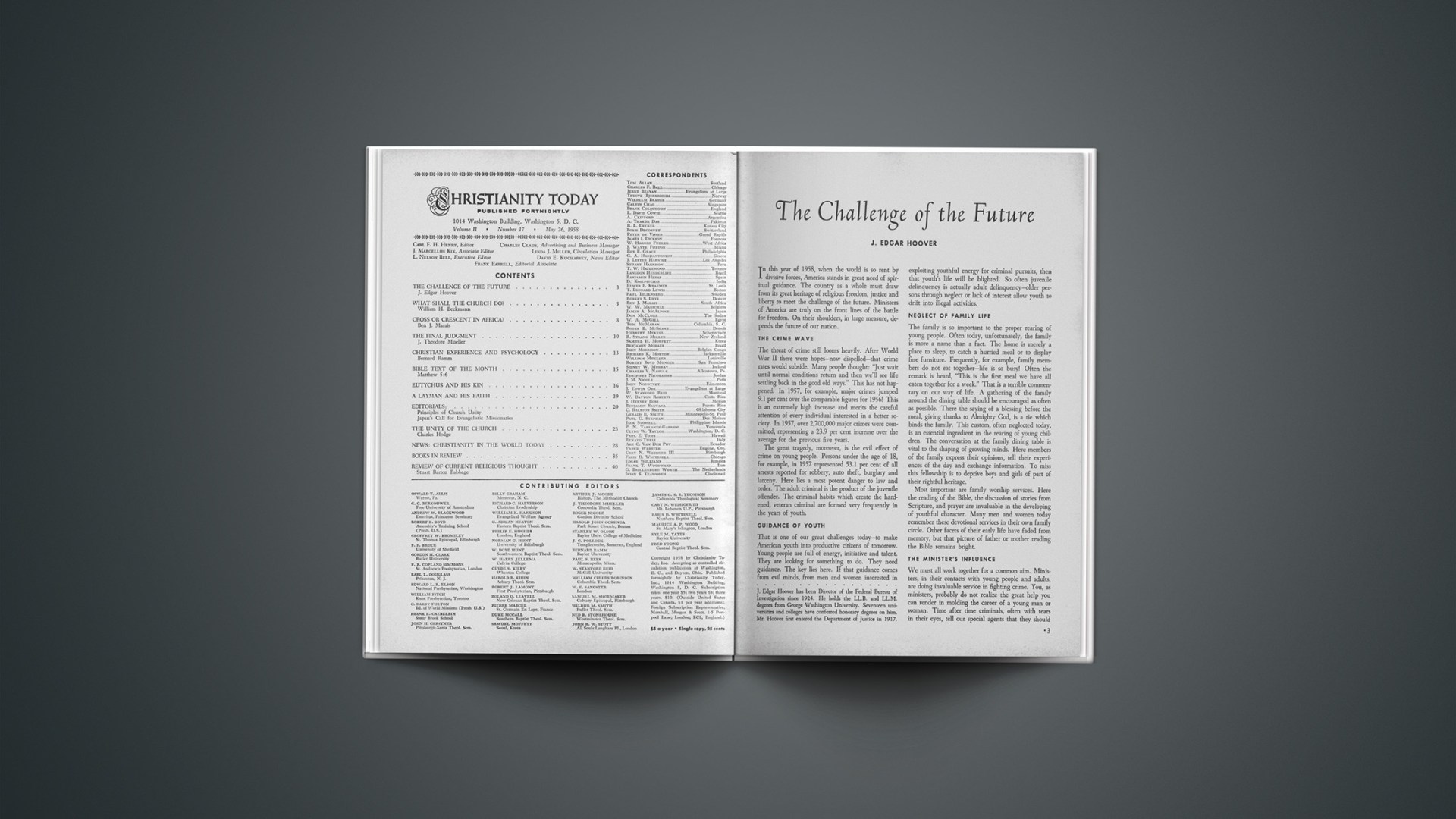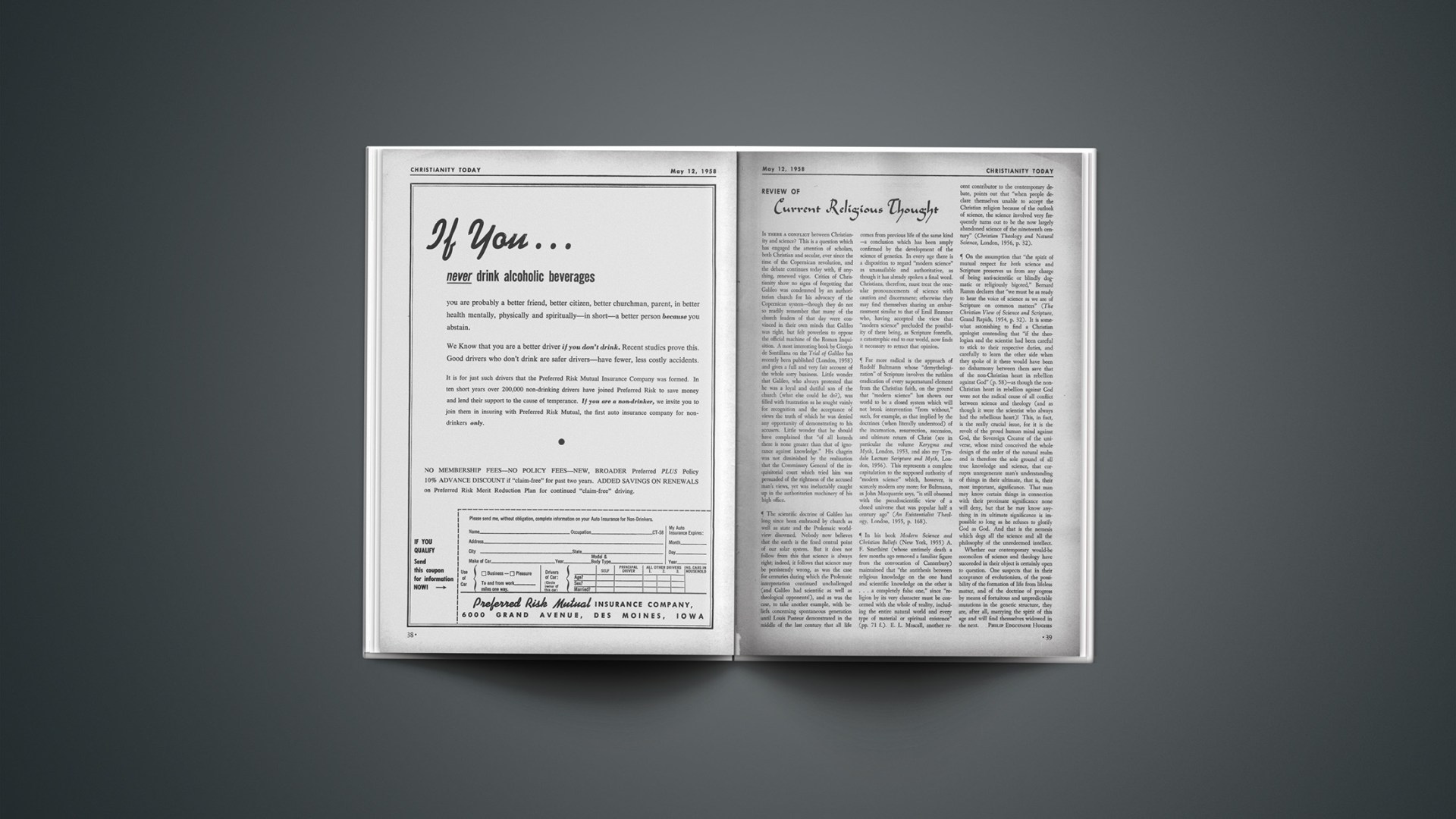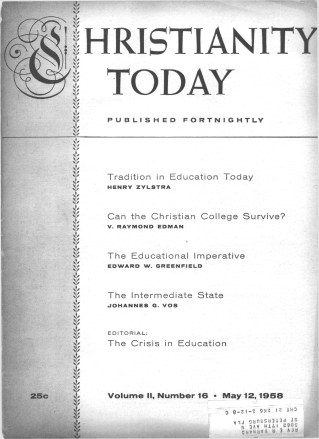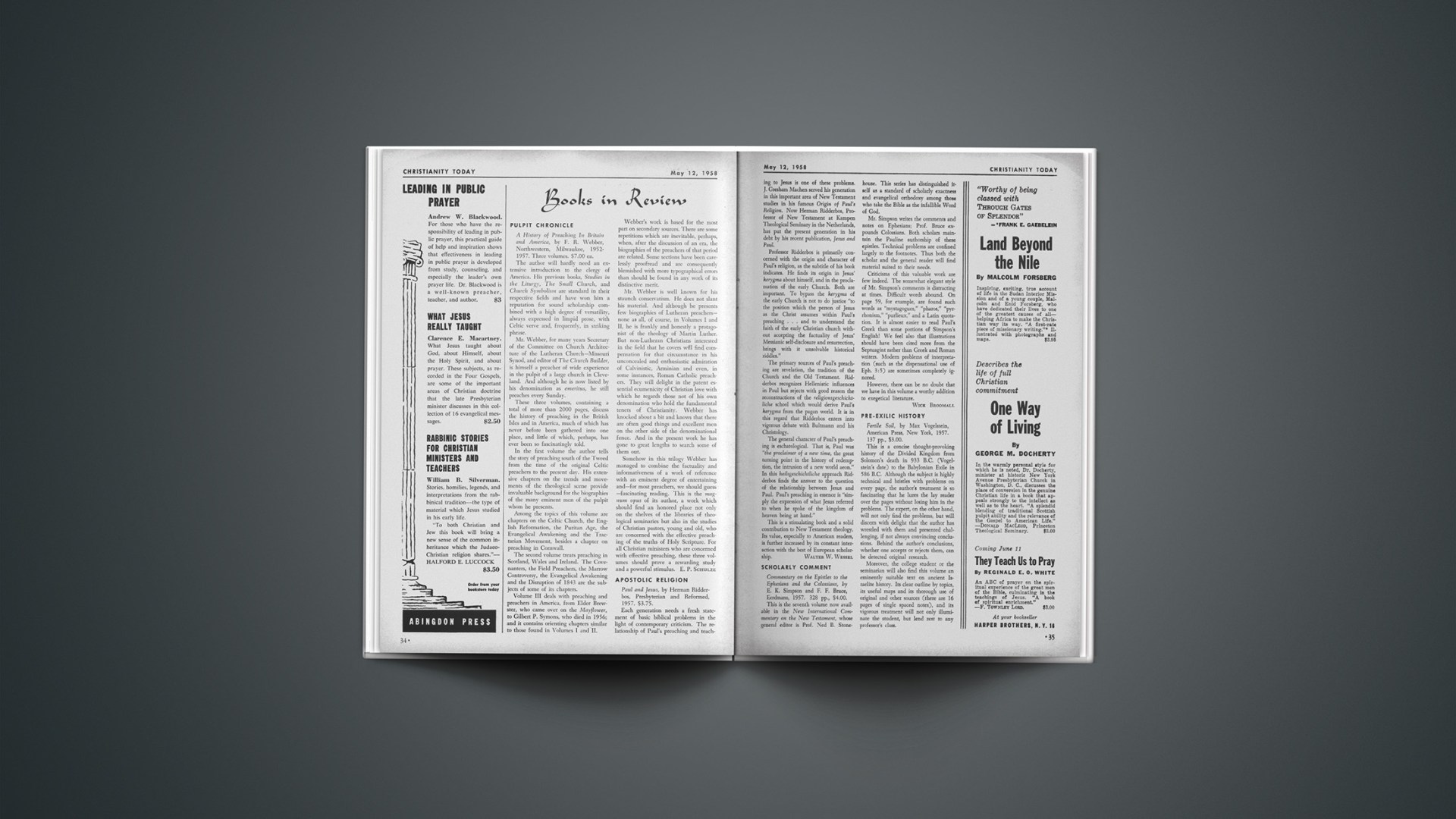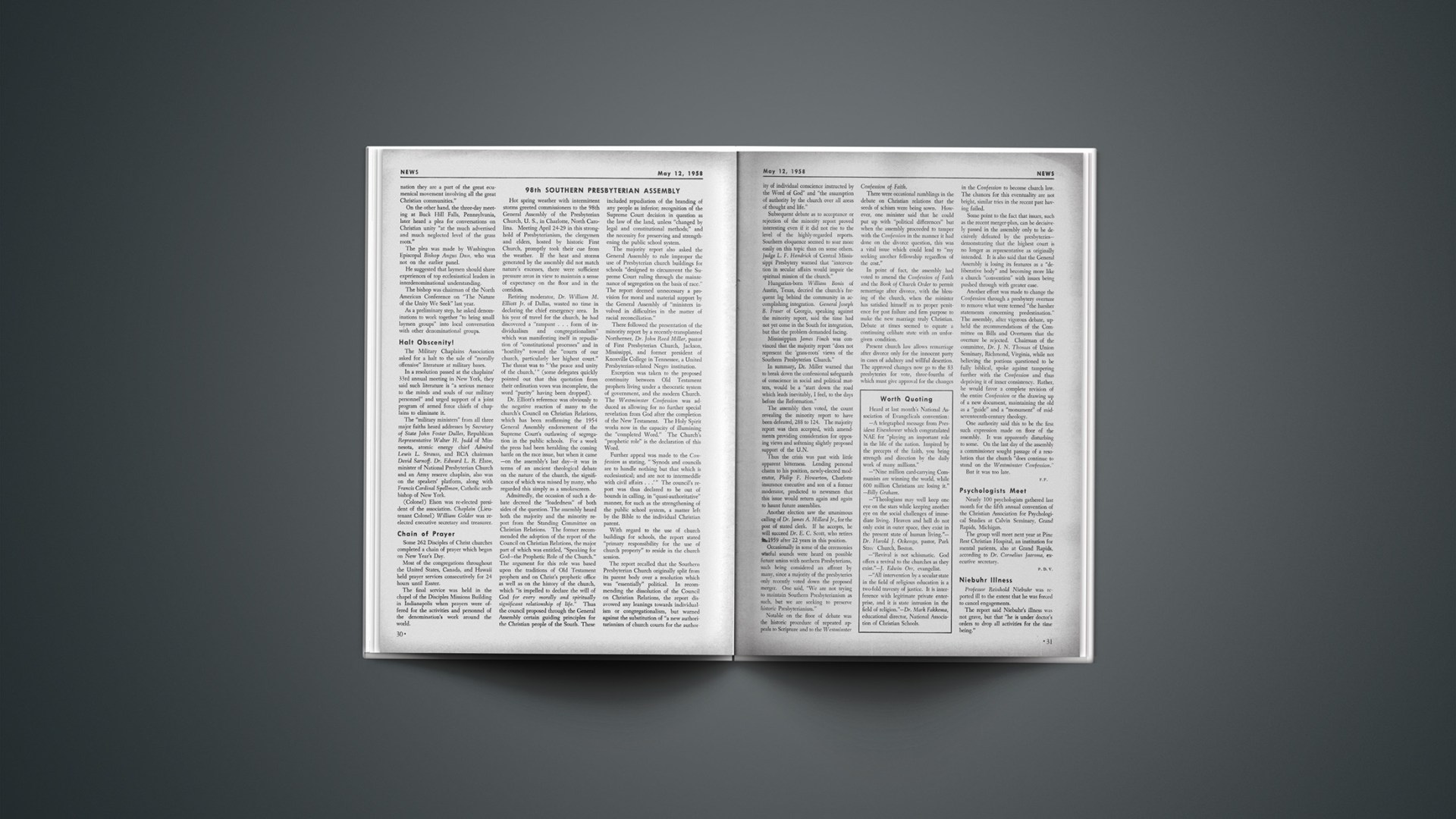INCOGNITO CHORALES
One of my kin has furnished me with a page from the student newspaper of a metropolitan seminary featuring the words for a new hymn by an anonymous author. The writer, having learned of the success of Arius in popularizing his heresy in song, feels that his seminary should not lose this wide open opportunity to spread its theology.
Old Tune, New Sentiment
His contribution to a great new movement is set to the tune of “What a Friend We Have in Jesus,” and begins:
“What a myth we have in Jesus
O how meaningful to me,
Existentially confronted
In artistic liturgy.
Though in life we often languish
Mid its ambiguity,
Jesus points to the solution,
Transcending all symbolically.”
This may have to be taken with a grain of salt, but it suggests what some of these newer movements in theology could do for (or to) the grand old hymns.
Rosy-Tinted Lyrics
Something of the kind has been tried in the past; you may remember the rosy-tinted lyrics:
“Just as I am, young, strong and free,
To be the best that I can be
For truth, and righteousness and Thee …”
This was substituted as a reversed version of the original:
“Just as I am, poor, wretched, blind;
Sight, riches, healing of the mind,
Yea, all I need in Thee I find.…
Existential Replacements
Since this substitution was not very successful, perhaps my kin can provide more existential replacements. Contributors may become charter subscribers to my monthly choir collection, Incognito Chorales. You may have a paradoxology in mind, or perhaps you can add to such new numbers as:
“A critic snips the sacred page …”
“Angels, from the realms of story …”
“My hope is built on less and less.…”
Psychotherapeutic psalmody is also desired; e.g., “Relax, my soul, calm every nerve.” Address all entries to:
EUTYCHUS
ADVENTIST AVALANCHE
My confidence in your integrity has been justified. While I might have added a bit more context to a quotation or two and, while I obviously arrive at different conclusions than Mr. Lindsell (Mar. 31, Apr. 14 issues), I must say that he states the case with integrity and fairness.
Alaska Mission of SDA
Ketchikan, Alaska
I found Mr. Lindsell’s article … deeply stimulating and indicative of considerable personal research. I congratulate a man who will investigate for himself before making an evaluation.
Marinette, Wis.
Lindsell … rediscovered the great bond that marks us all as brethren—our failings.
SDA Church
Mountain Home, Ark.
How does he classify the churches who actively support religious legislation in the form of Sunday laws? Where does grace end and legalism begin for those who teach the sufficiency of Christ’s death for man’s salvation, but who also seek to legislate that same man (as well as unbelievers) into a religious observance of a day under the threat of civil penalties?
Central Union Conference
Lincoln, Neb.
• A number of letters have made this point. If Sunday laws do represent legalism, it is here found in a far less crucial area than when ensconced in the doctrines of salvation.—ED.
Our good friend … would have us believe that because a man is saved by grace he can go on breaking the law … I take my stand with John Wesley, Martin Luther, John Knox, and D. L. Moody who make clear … that the law of God written on two tables of stone will stand through … eternity.
Lethbridge, Alta.
To the rich young ruler Christ said, “… If thou wilt enter into life, keep the commandments.” And it is unfortunate for Brother Lindsell and his fellow antinomians that this statement relating commandment-keeping to entering into eternal life, cannot be credited to Ellen G. White.
Reseda, Calif.
We … keep all ten of God’s commandments (only by power of Christ) … We disagree … that a person can be saved, sanctified, backslidden, satisfied, and yet saved.
SDA Church
Bellingham, Wash.
Could it possibly be that to qualify as an evangelical one must have a conscience that will permit him to knowingly disobey one of God’s Ten Commandments?… We cannot be saved by merely keeping the commandments but we can be lost by breaking them.
San Jose, Calif.
I strenuously protest … “A man may be a genuine believer who believes in soul sleep …” How can one, who disbelieves what the master said to the dying thief.
Christian & Missionary Alliance Church Altoona, Pa.
I cannot teach my children, for whom I am responsible to God, that they are at liberty to set aside or try and change any or all or one of God’s commandments …
Glendale, Calif.
The SDA position on the Sabbath observance is utterly hopeless … However, SDA can still build around the person of Christ and by junking its errors find a place with other Christian communities.
St. Andrew’s Episcopal
Port Angeles, Wash.
Is [the] child of God expected to obey God while growing up? And if so, is this not in some measure salvation by works?
Mr. Lindsell objects to the teaching of SDAs that disobedience to the command to “Remember the Sabbath day to keep it holy” might bar one from entrance into the kingdom of God. Should this be thought strange when … Paul … says that adultery, idolatry, hatred, murder, drunkenness … will keep one out of the kingdom of God?
SDA Church
Vincennes, Ind.
What I want to know is: the seventh from what? Has anyone gone back to the year one and traced all the weeks down to present date, to be sure that we have the right days? If we part and go around the world in opposite directions—when we meet again one has gained a day and one lost a day; which day should be kept? When the day comes that we are known and do know, I will not be surprised to learn that I have been keeping, perhaps, Wednesday and the seventh-day people Tuesday.
Newfield, N. J.
Mr. Lindsell makes quite a to-do over the Sabbath question but that is nothing more than a smoke-screen for the real issue of the Calvinistic doctrine, “once saved always saved.”
St. Simons Island, Ga.
This statement … I cannot accept: “One acid test marks off Reformation theology from both sacramental theology and all other viewpoints. This has to do with soteriology.…” Reformation theology is sacramental theology as far as Baptism and the Lord’s Supper are concerned.
Peace Lutheran Church
Seattle, Wash.
We do believe in annihilation of the wicked (Mal. 4). We do believe that eternal torment is more in keeping with the character of Satan than of our merciful heavenly Father.
Williamstown, Vt.
I am an Adventist minister … I fail to see how one can read very much on any of these doctrines and not be convinced by the great amount of biblical evidence available to the earnest seeker.
Dinuba, Calif.
SDAs … just 2000 years behind the times.
Gordonville, Pa.
Dr. Lindsell … declares, “I know of no SDA literature that hints that Mrs. White was ever wrong.” Allow me to refer Dr. Lindsell to the words of Mrs. White, “I had taken a wrong position,” cited by Arthur G. Daniells, President of the SDA denomination from 1901 to 1922, in The Abiding Gift of Prophecy, p. 327.
Emmanuel Missionary College
Berrien Springs, Mich.
• It is notable that the only charge of ‘wrongness’ adduced is one by Mrs. White herself. It would be of interest to know if this exhausts the list.—ED.
If God has spoken before—in Testament times—and he chooses to speak again in modern times, is it not possible that the authority of his latter communication is just as valid as the previous?… If Mrs. White … is in harmony with scriptural teaching, as SDAs believe she is, in dealing with vital scriptural doctrine, perhaps one had better be careful in denying a voice of authority in those areas in which she speaks which are not brought forward from definite scriptural statements …
The Sabbath … is a question as to the authority of Jehovah God versus Satan.
Howard University
Washington, D. C.
I have not been able to find that any appeal has been made to her [Mrs. White] writings in SDA doctrinal books to support the views now held by us.
Loma Linda, Calif.
If to be evangelical one must believe that the gifts of the Spirit, one of which is prophecy by divine revelation, are not to be manifest, heeded or accepted, then SDAs cannot be evangelical and still have any reason for being SDAs.
Everett, Wash.
Why are the SDAs the only Sabbath-keeping group singled out and called “legalist”? You will find the answer to the question in Rev. 12:17 [And the dragon was wroth with the woman, and went to make war with the remnant of her seed …].
Arlington, Calif.
Significant is it to say that … Lindsell’s article falls into two parts: a) Part II. SDA and the keeping of the commandments (i.e. “The Sabbath Test”). b) Part I. “Role of Ellen G. White” (i.e. the prophetic gift).
Did not Christ foretell, “war with the remnant (church) … which, a) keep the commandments of God, and b) have the testimony of Jesus Christ” Rev. 12:17. (The “testimony of Jesus” is “the Spirit of Prophecy” [Rev. 19:10] or the prophetic gift.) Certainly, “We have a more sure word of prophecy, etc.” (2 Pet. 1:19) in the fulfillment of these articles denouncing SDAs as “not evangelical.”
Press and Public Relations Bureau
Nottingham, England
I believe he honestly tries to evaluate it as an unbiased observer … I charge … Lindsell of deliberate misrepresentation.
Norfolk District of SDA
Norfolk, Neb.
Lindsell finds fault with … Nichol for defending Mrs. White … And if he had not defended her … would not … Lindsell have said that since the accusations against her had not been answered, … they were therefore true? There would appear to be no way of satisfying such a prejudiced mind.
Hawaiian Mission of SDA
Kailua-Kona, Hawaii
The article … was about as bold a display of antinomianism as I have ever seen.
White Plains, N. Y.
I do not hold … SDAs are … consistent or they would practice circumcision.
Pataskala, O.
Is he trying to hoodwink the ignorant and unthinking?
Lincoln, Neb.
Actually, the SDA authors he quotes couldn’t have done a better job in preaching the truths of SDA than Mr. Lindsell. As a SDA I wish to say, “Thank you, Mr. Lindsell. Please keep it up. Maybe the denomination will take you on as a full-time worker.”
Sikeston, Mo.
… Unscholarly contribution … Marietta, Ga.
I feel this is a very well-written and conclusive article on this prominent subject. I wish that it could be put into an attractive tract form to be used with SDAs and to inform Christians.
Glen, N. H.
I came across a very interesting … and fair analysis of SDA. The title … is “The Bible and SDA.” Under this heading the following … are considered: the cleansing of the sanctuary, observance of the Jewish Sabbath, eschatological errors, the inspiration of Mrs. Ellen G. White, salvation through the devil, and deceptive propaganda. This booklet can be obtained from the Faith, Prayer and Tract League, 1016 11th, NW, Grand Rapids, Mich.
Bluffton Christian Reformed Church
Muskegon, Mich.
COOPERATIVE EVANGELISM
Some months ago Christianity published an article in opposition to “separation.” Now it publishes another that avoids meeting the criticism that was made of the first one. In defense of having unbelievers sponsor evangelistic endeavors, Mr. Ferm (Apr. 14 issue) quotes Finney as saying, “My duty is to belong to the church, even if the devil should belong to it.” Does this mean that it would be a sin to leave a church if the devil controls it? At any rate, Mr. Ferm’s argument, during the course of which he asserts, “If it is compromise, then Finney compromised,” requires for its validity the unexpressed premise that Finney could not have compromised. Personally I do not hold such an exalted opinion of Finney. Nor do I think that Jesus’ preaching in the temple is comparable with being sponsored by unbelievers. Jesus did not have the sponsorship of the Pharisees.
The writer also appeals to Wesley, and rebukes some misinformed person who cited Wesley as a separationist. But now may we ask, is Mr. Ferm a member of the Anglican or Episcopal church? If separation is a sin, then all the Methodists are great sinners, and should return to their parent body. And all the rest of us, with them, should return to the Roman Catholic church. It is instructive to see that articles against separation, that is, against the purity of the Church, are ordinarily quiet as to the Protestant Reformation. Their arguments proceed on the tacit assumption that there are no apostate churches from which obedience to God requires separation. But such synagogues of Satan do indeed exist.
Indianapolis, Ind.
The article … is but further evidence of the bankruptcy of thought and unbiblical approach used by those enamored of the current ecumenical evangelism, in a futitle effort to vindicate it. To toss casually and indifferently aside “the few proof texts, such as 2 Cor. 6:14” advanced against the ecumenical program, and the substitution of example on the part of past evangelists, indicates the truthfulness of the fundamentalist charge that such programs are of men and not of God, since God makes known his will only through his Word. The “proof-texts” are not few …, but even if they were but few would still be proof-texts.
First Baptist Church
Johnson City, N. Y.
While it is not always wise to be continuously making war with apostates, it is deadly ever to make peace with them … The chasm between redemptive Christianity and non-redemptive religion … is not bridgeable.
New York City
Much on historical precedent; almost nothing for a scriptural basis. Thus, an extremely lopsided article.
Oldham Baptist Church
Oldham, S. Dak.
ON LOGICAL POSITIVISM
The March 17 issue carried a “Review of Current Thought” by Philip Edgcumbe Hughes of London which was a strange mixture of Scripture paraphrase, dogmatic arrogance, book reviews and confused thinking about contemporary British philosophy.…
From this article one would receive the impression that logical positivism was the current trend of philosophy in Britain and that Language, Truth and Logic by A. J. Ayer was its Bible. This is certainly a gross error. Mr. Hughes in the first paragraph identifies “contemporary linguistic philosophy” with logical positivism. This is a mistake all too common today.…
The book review of E. L. Mascall’s Words and Images is very interesting and rewarding reading … Mr. Hughes has rightly pointed out the Achilles heel of the book from the perspective of an evangelical Christian apologetic. However, I want to defend Dr. Mascall for not appealing to the doctrine of creation: he is not writing theology. Dr. Mascall feels that philosophical questions deserve philosophic answers. On the other hand, if Mr. Hughes had wished to criticize the book he should have concentrated on philosophic issues, for instance, the several Thomist assumptions in the book.…
Mr. Hughes … asserts that logical positivism would have to sacrifice logic to the verification principle. As a matter of history this did not happen; as a matter of logic it was not at all necessary.…
I won’t say much about the arrogant and dogmatic condemnations of the logical positivists.… Philosophic doctrines are not sinful; they are wrong. Mr. Hughes may be quite correct in his analysis of man as sinner. My only contention is that honest philosophic questions and arguments deserve honest sympathy and honest answers. Since it seems that Mr. Hughes cannot refute the positivists, he has used ad hominem arguments.…
Indiana University
Bloomington, Ind.
It is good of Mr. Perkins to take notice of my brief Review of Current Religious Thought; but how he managed to receive the impression from what I wrote that logical positivism is “the current trend of philosophy in Britain” and Professor Ayer’s Language, Truth and Logic “its Bible” is a mystery that I have not succeeded in solving. Such a view would indeed be, as Mr. Perkins affirms, “a gross error.” The error, however, resides in his impression rather than in my article, for I neither wrote nor implied any such thing. Mr. Perkins also completely fails to meet my point about the incompatibility of the concept of logic with the verification principle of the logical positivists. As for Dr. Mascall’s Thomistic predilections, I am of course well aware of these, but lack of space precluded an examination of this aspect of his thought.
To suggest, as Mr. Perkins does, that Mascall eschews theology in his book shows the former’s reading of the book to be suspect, for Dr. Mascall does no such thing; nor is it correct to state that he makes no appeal to the doctrine of creation—on the contrary, he speaks of “that unique but universal characteristic of finite beings which manifests their dependence upon the creative activity of a transcendent cause, the God of Christian theology.” My complaint was that Dr. Mascall has failed to indicate in a consistent manner the crucial relevance of this doctrine in any debate on epistemology from the Christian side. I believe that Mr. Perkins is fundamentally wrong in supposing that “philosophical questions deserve philosophical answers,” when the person giving the answers is a Christian. Can he really believe that the fact of man’s creaturehood and fallenness has no bearing on philosophy and must be dismissed as irrelevant theology? In making a distinction between what is sinful and what is wrong I presume Mr. Perkins will be prepared to grant that wrongness is not unconnected with the root of sinfulness. I am consoled that he should have found my review of Dr. Mascall’s book “very interesting and rewarding reading,” for that means the major portion of my article. London

